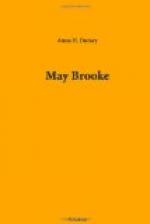“And that means every thing, Mr. Stillinghast. She saved your life. She used the best remedies; she put ice about your head, and bled you. When I came you were out of danger; but be calm, sir; let me beseech you to be calm,” said the doctor.
“Did you do all this, little May?” he asked, looking earnestly at her with his piercing gray eyes.
“Yes, sir; I had read that such remedies were necessary.”
“Why did you do it, little one? My life or death is of no interest to you. Tell me why you did it?” he whispered.
“Oh, dear uncle, forgive me!” said May, while her tears dripped like rain-drops on her wan cheek; “I knew that you had made no preparation for death. I would have died that you might live long enough to effect a reconciliation with Heaven.”
“Profit—gain—loss—loss—loss!” he murmured; then suddenly he put up his feeble hand, and drawing May’s face closer to him, kissed her cheek. “If it is not too late, pray for me!” he whispered, in tones so low that she scarcely heard them.
“Not too late. Oh no, dear uncle, it is not too late,” said May, smoothing back the tangled gray hair from his sunken temples.
“Mr. Stillinghast, my dear sir, I fear that you are exciting yourself. I would recommend quiet, composure; indeed, sir, it is absolutely necessary in your case,” said the doctor, looking on uneasily.
“It will make no difference, sir. I know full well whose finger has touched me. Do you know that I cannot move my left side?” said the old man in his firm, stern way.
“I feared it,” said the doctor, turning away to conceal the expression of pain which this information caused him; “but it may pass off, you may quite recover yet, sir. A cup of weak tea would be good for our patient,” he said to May.
May glided out of the room, followed by the gaze of the stricken old man, to prepare it for him. She ran up to awaken Helen, and told her that their uncle was dangerously ill. “Dress, dear Helen, and go to him immediately, while I get a cup of tea for him.”
“How very pale you are, May! Is he in danger?” exclaimed Helen, starting up, quite awakened by the news.
But May was gone. When she went up again with the cup and saucer in her hand, Mr. Stillinghast greeted her with a look of welcome.
“Do not leave me again,” he whispered, as he sipped the tea; “it will not be long, little one, that I shall keep you. Take this away now, and send for Mr. Fielding.”
“Perhaps you know Mr. Fielding, sir?” said May, to Dr. Burrell.
“He is my neighbor. Can I be of service?” he replied.
“My uncle wishes to see him as early as possible. He is his man of business, I think,” replied May, who felt anxious that Mr. Stillinghast should attend to his worldly concerns, and wind them up as soon as possible, that all the energies of his soul might be directed to higher objects.




